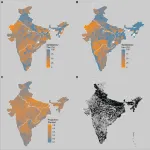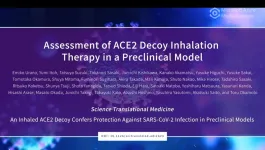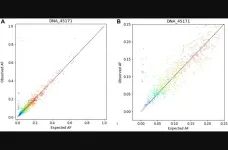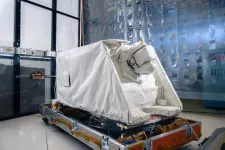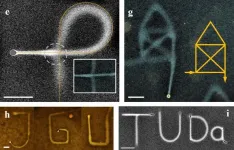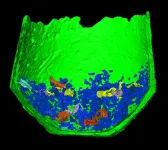(Press-News.org) A relatively small intervention could have a huge impact on a damaging condition that stalks children in the developing world. A new Stanford-led study shows that adding zinc to farmland soil can help prevent childhood stunting, a condition due to chronic undernutrition that is associated with poor brain development and long-lasting harmful consequences, such as reduced school performance and increased disease risks. The paper, published Aug. 21 in Scientific Reports is the first large-scale study to examine the association between children’s nutritional status or health outcomes and soil mineral availability in India, where more than a third of children under five suffer from stunting.
“Our results add to a growing body of literature suggesting that interventions like micronutrient-enriched fertilizers may have a positive effect on health,” said study lead author Claire Morton, an undergraduate in mathematics and computational science at Stanford University. “This doesn’t prove that those interventions would be cost-effective for India, but it’s an exciting indication that they are worth testing.”
The researchers analyzed health data from nearly 300,000 children and one million women across India with over 27 million soil tests drawn from a nationwide soil health program. They found that that the presence of zinc in soil helps prevent stunted childhood growth, and iron in soil helps keep hemoglobin – a protein in red blood cells that carries oxygen – at healthy levels. The results suggest that fortifying soil with minerals could be a beneficial health intervention.
The link between soil zinc and childhood stunting is particularly robust — a one standard deviation increase in satisfactory soil zinc tests is associated with approximately 11 fewer children stunted per 1,000, according to the research. As a result, the researchers suggest that the potential benefits of using zinc-enriched fertilizers as health interventions deserves more consideration in India specifically and perhaps more generally.
“We’re not saying that geography is destiny, but soils really do seem to play a role in shaping child health,” said study senior author David Lobell, the Gloria and Richard Kushel Director of Stanford’s Center on Food Security and the Environment and professor of Earth system science in the Stanford Doerr School of Sustainability. “Even if this is only a small role, understanding it could help to identify better approaches to solving child stunting in India, which is one of the single biggest and longstanding challenges in global food security."
Coauthors of the study also include Hemant Pullabhotla of Deakin University in Australia and Leah Bevis of Ohio State University.
Funding for the study was provided by the Stanford Sustainability and Earth Summer Undergraduate Research program and the Stanford King Center on Global Development
END
Stanford-led study reveals way to help prevent childhood stunting
Research shows adding minerals to farmland soil could help prevent condition associated with long-lasting harmful consequences.
2023-08-30
ELSE PRESS RELEASES FROM THIS DATE:
Validation of a comprehensive genomic profiling assay: NeXT Dx™
2023-08-30
“NeXT Dx incorporates a range of features and comprehensive genome variant detection methods that lead to improved disease management and possible enhanced clinical utility.”
BUFFALO, NY- August 30, 2023 – A new research paper was published in Oncotarget's Volume 14 on August 30, 2023, entitled, “Analytic validation of NeXT Dx™, a comprehensive genomic profiling assay.”
In this new research paper, researchers Juan-Sebastian Saldivar, Jason Harris, Erin Ayash, Manqing Hong, Prateek Tandon, Saloni Sinha, Patricia Miranda Hebron, Erin E. Houghton, ...
UC Davis names Blake Meyers as new Genome Center director
2023-08-30
Blake Meyers, a principal investigator at the Donald Danforth Plant Science Center and a professor of plant sciences from the University of Missouri - Columbia, has been named the new director and Novozymes Chair in Genomics at the UC Davis Genome Center. Meyers, who studies plant RNA biology, bioinformatics and functional genomics, will step into the role on March 1.
A member of the National Academy of Sciences, Meyers succeeds the center’s founding director Richard Michelmore, a distinguished professor in the departments of Plant Sciences, Molecular and Cellular Biology, and Medical Microbiology and Immunology.
Roots ...
NASA to demonstrate laser communications from space station
2023-08-30
NASA uses the International Space Station — a football field-sized spacecraft orbiting Earth — to learn more about living and working in space. For over 20 years, the space station has provided a unique platform for investigation and research in areas like biology, technology, agriculture, and more. It serves as a home for astronauts conducting experiments, including advancing NASA’s space communications capabilities.
In 2023, NASA is sending a technology demonstration known as the Integrated LCRD Low Earth Orbit User ...
Educational attainment protects against a genetic risk factor for Alzheimer’s disease
2023-08-30
A new study by researchers from Mass General Brigham further illustrates that when it comes to risk of Alzheimer’s disease, even genetically determined forms of the disease, genetics is only one piece of the puzzle. Researchers investigated the influence of genetics and educational attainment on cognitive decline by studying data from 675 people who carry a mutation that predisposes them to early onset Alzheimer’s disease. Carriers of this mutation—known as PSEN1 E280A—have a median age of 49 for onset of dementia. The team found that among ...
Virtual institute at the University of Kansas to combat cyber threats
2023-08-30
LAWRENCE, KANSAS — A new virtual institute established at the University of Kansas School of Engineering will train the next generation of military and civilian leaders to better combat the growing threat of cyberattacks and protect the electromagnetic spectrum (EMS).
KU received a two-year, $1.5 million grant from the Department of Defense to establish the program, known as the Virtual Institutes for Cyber and Electromagnetic Spectrum Research and Employ, or VICEROY, Virtual Institute. The grant is overseen by the Griffiss Institute, which is a nonprofit talent ...
How to write in water?
2023-08-30
Writing is an age-old cultural technique. Thousands of years ago, humans were already carving signs and symbols into stone slabs. Scripts have become far more sophisticated since then but one aspect remains the same: Whether the writer is using cuneiform or a modern alphabet, a solid substrate, such as clay or paper, is required to fix the written structures in place. However, researchers at Johannes Gutenberg University Mainz (JGU), TU Darmstadt, and Wuhan University asked themselves how to write in a bulk fluid like water without fixing substrates. The concept would not be unlike the way aircraft leave three-dimensional vapor trails behind them when they ...
Stanford Medicine-led study finds genetic factor fends off Alzheimer’s and Parkinson’s
2023-08-30
About one in every five people carries a version of a gene that, although largely unsung, appears to confer protection against both Alzheimer’s disease and Parkinson’s disease, Stanford Medicine investigators and their colleagues have learned. These lucky people may someday benefit all the more from a vaccine that could slow or stall the progression of these two most common neurodegenerative conditions.
An analysis of medical and genetic data from hundreds of thousands of people of diverse ancestries from several continents has revealed ...
First-time fathers seem to experience a steeper decline in relationship satisfaction in the first two years post-partum than second-time fathers
2023-08-30
First-time fathers seem to experience a steeper decline in relationship satisfaction in the first two years post-partum than second-time fathers, who appear to recover lost relationship satisfaction by the time their second child is 14 months old, according to a study published August 30, 2023 in the open-access journal PLOS ONE by Judith T. Mack and Lena Brunke from Technische Universität Dresden, Germany, and colleagues.
Having a strong primary relationship can help couples more successfully weather potentially-challenging transitions like the birth of a child. Most research on ...
Detailed analysis of two Late Bronze Age urn burials uncovers animal bones and jewelry amidst the cremated remains of a woman and child, and reveals insights into prehistoric funerary rites
2023-08-30
Detailed analysis of two Late Bronze Age urn burials uncovers animal bones and jewelry amidst the cremated remains of a woman and child, and reveals insights into prehistoric funerary rites
###
Article URL: https://journals.plos.org/plosone/article?id=10.1371/journal.pone.0289140
Article Title: More than urns: A multi-method pipeline for analyzing cremation burials
Author Countries: Austria, Slovakia, Czech Republic, Belgium
Funding: This study was funded by the Austrian Science Fund (FWF) in the framework of the project ‘Unlocking the secrets ...
Antibody shows promise for preventing organ rejection after transplantation
2023-08-30
DURHAM, N.C. – A man-made antibody successfully prevented organ rejection when tested in primates that had undergone a kidney transplant, Duke Health researchers report.
The finding clears the way for the new monoclonal antibody to move forward in human clinical trials. Results of the study appear online Aug. 30 in the journal Science Translational Medicine.
“Current medications to prevent organ rejection are good overall, but they have a lot of side effects,” said lead author Imran J. Anwar, M.D., a surgical research fellow ...
LAST 30 PRESS RELEASES:
Alkali cation effects in electrochemical carbon dioxide reduction
Test platforms for charging wireless cars now fit on a bench
$3 million NIH grant funds national study of Medicare Advantage’s benefit expansion into social supports
Amplified Sciences achieves CAP accreditation for cutting-edge diagnostic lab
Fred Hutch announces 12 recipients of the annual Harold M. Weintraub Graduate Student Award
Native forest litter helps rebuild soil life in post-mining landscapes
Mountain soils in arid regions may emit more greenhouse gas as climate shifts, new study finds
Pairing biochar with other soil amendments could unlock stronger gains in soil health
Why do we get a skip in our step when we’re happy? Thank dopamine
UC Irvine scientists uncover cellular mechanism behind muscle repair
Platform to map living brain noninvasively takes next big step
Stress-testing the Cascadia Subduction Zone reveals variability that could impact how earthquakes spread
We may be underestimating the true carbon cost of northern wildfires
Blood test predicts which bladder cancer patients may safely skip surgery
Kennesaw State's Vijay Anand honored as National Academy of Inventors Senior Member
Recovery from whaling reveals the role of age in Humpback reproduction
Can the canny tick help prevent disease like MS and cancer?
Newcomer children show lower rates of emergency department use for non‑urgent conditions, study finds
Cognitive and neuropsychiatric function in former American football players
From trash to climate tech: rubber gloves find new life as carbon capturers materials
A step towards needed treatments for hantaviruses in new molecular map
Boys are more motivated, while girls are more compassionate?
Study identifies opposing roles for IL6 and IL6R in long-term mortality
AI accurately spots medical disorder from privacy-conscious hand images
Transient Pauli blocking for broadband ultrafast optical switching
Political polarization can spur CO2 emissions, stymie climate action
Researchers develop new strategy for improving inverted perovskite solar cells
Yes! The role of YAP and CTGF as potential therapeutic targets for preventing severe liver disease
Pancreatic cancer may begin hiding from the immune system earlier than we thought
Robotic wing inspired by nature delivers leap in underwater stability
[Press-News.org] Stanford-led study reveals way to help prevent childhood stuntingResearch shows adding minerals to farmland soil could help prevent condition associated with long-lasting harmful consequences.
